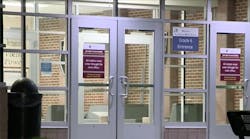2 Michigan schools close temporarily after mercury is found in water
A middle school and a high school in Rochester Hills, Mich., were closed Tuesday because of possible mercury contamination of its water supply.
WDIV-TV reports that classes were canceled at Van Hoosen Middle School and Adams High School after testing of water from Van Hoosen registered mercury levels significantly higher than the maximum contaminant level recommended by Environmental Protection Agency.
Because Adams' water comes from the same source as Van Hoosen, officials in the Rochester district decided to close that campus as a precaution
According to an email sent to parents, a laboratory manager and research professor at Arizona State University raised concerns about a water sampling that was sent by one of the Rochester teachers during a science experiment.
"Although the tests were not conducted by certified personnel or sent to a certified lab for testing water quality, we still take these concerns very seriously," the email stated.
The university report showed that a Van Hoosen science room faucet had high mercury levels.
In the school's science experiment, fhree samples were tested: one from Van Hoosen Middle School, one from Paint Creek and one from Sargent Creek. The average sampling was 0.056 mg/L or 56 ppb. The EPA maximum contaminant level goal for mercury is 0.002 mg/L or 2 ppb.
Officials from the Rochester Hills Department of Public Works are collecting water at both schools for testing at a certified lab.
The Detroit News reports that Mark Edwards, a Virginia Tech water expert who helped expose Flint's lead-contaminated water crisis, says it is unusual for mercury to be found in a drinking water supply. Rarely, mercury accidentally mixes with water if "chemicals are pumped backwards against the pressure to the water system."
Mercury is more toxic than lead, Edwards says, and the school district was wise to close the schools for more testing.
“It should be taken very seriously,” he says. “It’s right up there with lead in terms of dangers and known health effects.”


